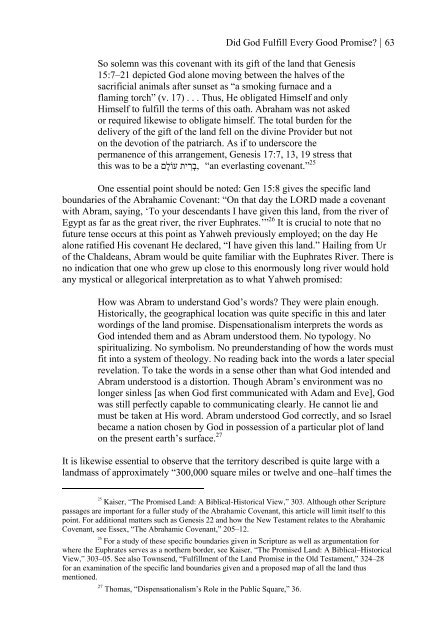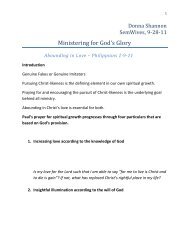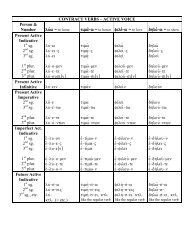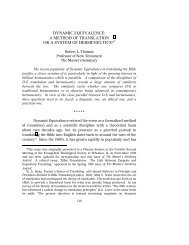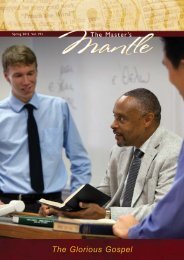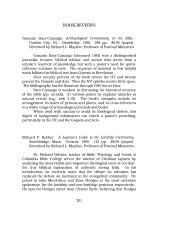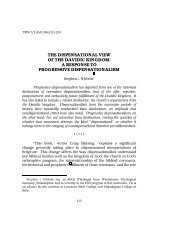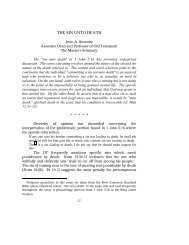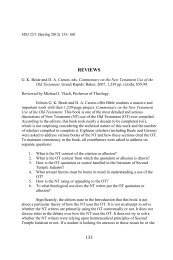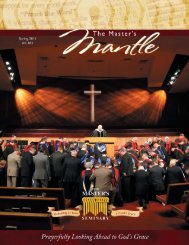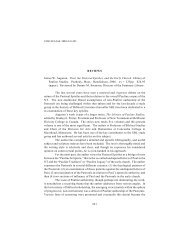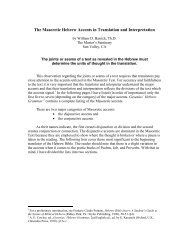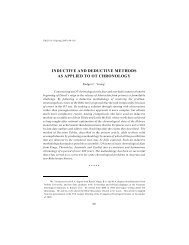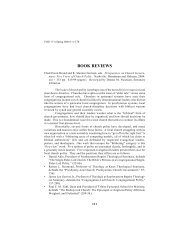Did God Fulfill Every Good Promise? - The Master's Seminary
Did God Fulfill Every Good Promise? - The Master's Seminary
Did God Fulfill Every Good Promise? - The Master's Seminary
Create successful ePaper yourself
Turn your PDF publications into a flip-book with our unique Google optimized e-Paper software.
<strong>Did</strong> <strong>God</strong> <strong>Fulfill</strong> <strong>Every</strong> <strong>Good</strong> <strong>Promise</strong>? | 63So solemn was this covenant with its gift of the land that Genesis15:7–21 depicted <strong>God</strong> alone moving between the halves of thesacrificial animals after sunset as “a smoking furnace and aflaming torch” (v. 17) . . . Thus, He obligated Himself and onlyHimself to fulfill the terms of this oath. Abraham was not askedor required likewise to obligate himself. <strong>The</strong> total burden for thedelivery of the gift of the land fell on the divine Provider but noton the devotion of the patriarch. As if to underscore thepermanence of this arrangement, Genesis 17:7, 13, 19 stress thatthis was to be a ית עוֹלָם ,בְרִ “an everlasting covenant.” 25One essential point should be noted: Gen 15:8 gives the specific landboundaries of the Abrahamic Covenant: “On that day the LORD made a covenantwith Abram, saying, ‘To your descendants I have given this land, from the river ofEgypt as far as the great river, the river Euphrates.’” 26 It is crucial to note that nofuture tense occurs at this point as Yahweh previously employed; on the day Healone ratified His covenant He declared, “I have given this land.” Hailing from Urof the Chaldeans, Abram would be quite familiar with the Euphrates River. <strong>The</strong>re isno indication that one who grew up close to this enormously long river would holdany mystical or allegorical interpretation as to what Yahweh promised:How was Abram to understand <strong>God</strong>’s words? <strong>The</strong>y were plain enough.Historically, the geographical location was quite specific in this and laterwordings of the land promise. Dispensationalism interprets the words as<strong>God</strong> intended them and as Abram understood them. No typology. Nospiritualizing. No symbolism. No preunderstanding of how the words mustfit into a system of theology. No reading back into the words a later specialrevelation. To take the words in a sense other than what <strong>God</strong> intended andAbram understood is a distortion. Though Abram’s environment was nolonger sinless [as when <strong>God</strong> first communicated with Adam and Eve], <strong>God</strong>was still perfectly capable to communicating clearly. He cannot lie andmust be taken at His word. Abram understood <strong>God</strong> correctly, and so Israelbecame a nation chosen by <strong>God</strong> in possession of a particular plot of landon the present earth’s surface. 27It is likewise essential to observe that the territory described is quite large with alandmass of approximately “300,000 square miles or twelve and one–half times the25Kaiser, “<strong>The</strong> <strong>Promise</strong>d Land: A Biblical-Historical View,” 303. Although other Scripturepassages are important for a fuller study of the Abrahamic Covenant, this article will limit itself to thispoint. For additional matters such as Genesis 22 and how the New Testament relates to the AbrahamicCovenant, see Essex, “<strong>The</strong> Abrahamic Covenant,” 205–12.26For a study of these specific boundaries given in Scripture as well as argumentation forwhere the Euphrates serves as a northern border, see Kaiser, “<strong>The</strong> <strong>Promise</strong>d Land: A Biblical–HistoricalView,” 303–05. See also Townsend, “<strong>Fulfill</strong>ment of the Land <strong>Promise</strong> in the Old Testament,” 324–28for an examination of the specific land boundaries given and a proposed map of all the land thusmentioned.27 Thomas, “Dispensationalism’s Role in the Public Square,” 36.


